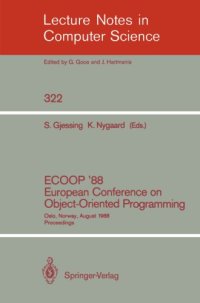
Ebook: ECOOP ’88 European Conference on Object-Oriented Programming: Oslo, Norway, August 15–17, 1988 Proceedings
- Genre: Computers // Programming
- Tags: Programming Techniques, Artificial Intelligence (incl. Robotics)
- Series: Lecture Notes in Computer Science 322
- Year: 1988
- Publisher: Springer-Verlag Berlin Heidelberg
- Edition: 1
- Language: English
- djvu
“ ..... object oriented seems to be becoming in the 1980s what structured programming was in the 1970s. ” Brian Randell and Pete Lee This quotation is from the invitation to the annual Newcastle University Conference on Main Trends in Computing, September 1988. It seems to capture the situation quite well, only that the object orientation is being materialised in languages and language constructs, as well as in the style of programming and as a perspective upon the task considered. The second European Conference on Object Oriented Programming (ECOOP’88) was held in Oslo, Norway, August 15-17, 1988, in the city where object oriented programming was born more than 20 years ago, when the Simula language appeared. The objectives of ECOOP’88 were to present the best international work in the field of object oriented programming to interested participants from industry and academia, and to be a forum for the exchange of ideas and the growth of professional relationships.
The field of Object-Oriented Programming (OOP) has attracted increasing attention during the last few years. OOP is now recognized as an important tool for making better and more flexible information systems. This book is the proceedings of the second European Conference on Object-Oriented Programming (ECOOP '88) that was held in Oslo, Norway, from August 15 to 17, 1988. The objectives of ECOOP '88 were to present the best international work in the field of OOP to interested persons from industry and academia, and to be a forum for the exchange of ideas and the growth of professional relationships. Each of the 103 papers submitted was subject to a thorough refereeing process. The 22 papers selected are collected in these proceedings together with one invited paper. These 23 papers from 13 different countries comprise the currently best international work in the field of OOP. The contents of the papers include areas such as: Theory, Languages, Didactics, Implementation, Applications, Concurrency and Databases. The interest in object-oriented programming is rapidly increasing, especially within the areas of Concurrency and Databases. With its 5 papers on concurrency and 7 papers on databases, the proceedings contain important new material on these subjects. This book is a must for persons who want to keep themselves up to date in the field of OOP.